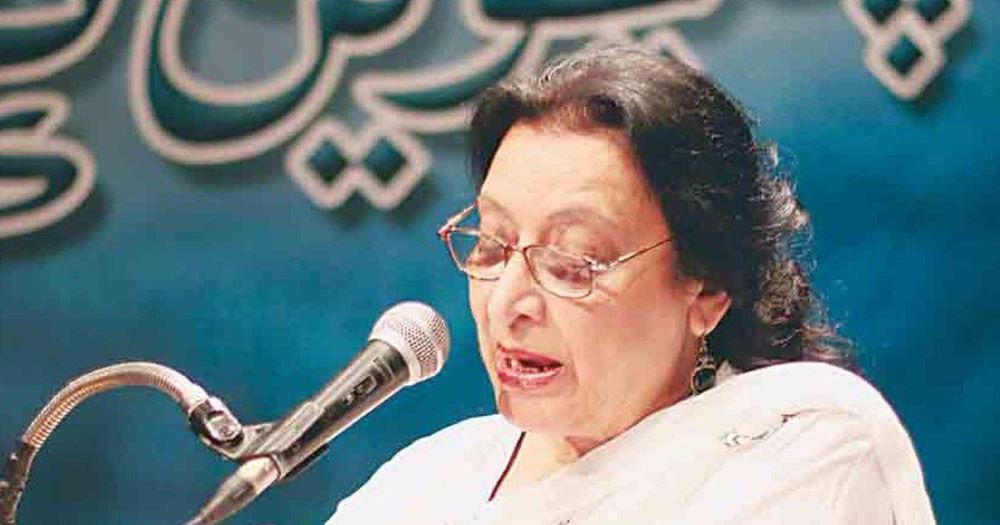For Fahmida, personal freedom and Constitutional democracy were inherently intertwined with the idea of justice
On a sultry Karachi afternoon in 2017, at the iconic Beach Luxury Hotel where I was speaking at a Literature Festival, I spotted Fahmida Riaz in a wheelchair. Making my way through the crowds, I rushed to her and offered my greetings: “Aadaab, Fahmida Apa”. She looked at me: “Saif Mahmood! Kab aaye?” [Saif Mahmood! When did you arrive?], and without waiting for me to respond, added: “Kya haal bana liya hai apne mulk ka? Hum tou tumhaari misaaleiñ dete thhe.” [What have you done to your country? We used to cite you as an example].
Not knowing what else to say, I sought refuge in her far-famed poem on India, “Tum bilkul hum jaise nikle” [‘You turned out to be exactly like us’]: “Aap ki nazm aaj kal ke halaat par bohot mauzooñ hai” [‘Your poem seems very apt for the current situation’], I said, my head bowed in shame. She nodded hers: “Ab tou nazm badal deni chaahiye – tum tou hum se bhi do haath aage nikle!” [The poem should be changed now – You turned out to be even worse!]. This was my last meeting with Fahmida Riaz; and probably her last meeting with anyone from India, the country she adored and where, hounded by her own government, she lived safely for seven years.
Poetic and a poet’s freedom
I had always known Fahmida as a fearless, feisty, outspoken woman, occasionally aggressive, and always full of life. In a slow-paced style, she would recite her fiery poetry, interspersed with typical Hindi expressions, exhorting her audience to march on even in the darkest of times. But the Fahmida I met that afternoon was a heartbroken poet, a disillusioned global citizen grieving the crumbling of secular democracy in South Asia.
For Fahmida, personal freedom and Constitutional democracy were inherently intertwined with the idea of justice, and at the heart of her fight for justice was the question of gender equality. Asked once if she was a feminist, Fahmida had responded: “What feminism means to me is simply that women, like men, are complete human beings with limitless possibilities”; and this brand of feminism runs across her works like a golden thread. When General Zia-ul-Haq issued orders forcing Pakistani women to cover themselves with a black chador, she tore into his autocratic diktat, advising him to cover his own misdeeds with the same chador:
Huzur! maiñ is siyaah chaadar ka kya karooñgi?
Ye aap kyoñ mujh ko baḳhshte haiñ basad inaayat?
Na sog meiñ hooñ ki us ko oḌhooñ
Gham-o-alam ḳhalq ko dikhaaooñ
Na rog hooñ maiñ ki is ki taareekiyoñ meiñ ḳhiffat se Doob jaaoñ
Na maiñ gunahgaar hooñ na mujrim
Ke is syaahi ki mohr apni jabeeñ pe har haal meiñ lagaaoñ
Agar na gustaaḳh mujh ko samjheiñ
Agar maiñ jaañ ki amaan paooñ
Tou dast-basta karooñ guzaarish
Ke banda-parvar
Huzur ke hujra-e-mu’attar meiñ ek laasha paḌa hua hai
Na jaane kab ka gala saḌa hai
Ye aap se rahm chaahta hai
Huzur! itna karam tou keeje
Siyaah chaadar mujhe na deeje
Siyaah chaadar se apne hujre ki be-kafan laash Dhaañp deejiye
[My Lord! what will I do with this black chador?
Why do you bestow it upon me so kindly?
I’m not in mourning,
Don’t have to announce my grief to the world
Neither am I a dreadful disease to be drowned in its darkness
Nor a sinner or a criminal obliged to stamp her forehead with its blackness
Pardon my audacity but, with folded hands, I have a request to make:
My Lord! In your sweet-smelling chamber lies a naked body, decayed and rotten for, God knows, how long!
It pleads for your mercy
My Lord! Show at least this bit of kindness –
Don’t give me this black chador
Use it to cover this naked body lying in your chamber]
Fahmida’s poetry is inherently polemical. In a patriarchal socio-political system presided over by condescending men – and women – she does not hesitate to publicly call out those who try to patronize her:
Inqilaab ke raaj singhaasan par biraajte gunvaano!
Tum kya do ge gyaan mujhe!
Mujhko seedhi raah dikhaane waalo!
Itna pehchaano
Tum kursi par baithe hue ho
Aur maiñ dharti par khadi hui hooñ
[O ye worthy, who sit on the royal throne of revolution!
Will you lecture me now?
O ye, who show me the right path!
You must realize
While you sit on a chair, I stand on the ground]

The voice of resistance
Her voice is the voice of resistance, the voice of those voiceless millions who want to be heard but are not, not just in her own country but the world over. Deeply convinced that injustice anywhere contributes to an unjust world, she concerns herself with global issues: the Palestinian question, the Afghan civil war, and hate politics in India – all find a place in her works. But to say that Fahmida’s resistance is only political would not just be terribly untrue, it would also slight her rather wide and eclectic canvas. Right from the publication of her collection Badan Dareedah (Torn-Bodied) in the 1970s to what was, perhaps, her last poem, “Inquilabi Aurat” (Revolutionary Woman) published in 2018, she challenges orthodoxy, questions the stereotype, defies norms, concerns herself with complexities of relationships and the imperfection of humans, and treats women’s sexuality with boldness and sensitivity. Accusing her lover of loving only her body, she reminds him that the body will change:
Kab tak mujh se pyaar karoge?
Kab tak?
Jab tak mere rahm se bachche ki taḳhleeq ka ḳhoon bahega?
Jab tak mera rañg hai taaza?
Jab tak mera añg tana hai?
Par is ke aage bhi tou kuchh hai
Vo sab kya hai?
Kisey pata hai
Vaheeñ ki ek musaafir maiñ bhi
Anjaane ka shauq baḌa hai
Par tum mere saath na hoge tab tak
[How long will you love me?
How long?
Till child-bearing blood flows from my womb
Till my color is fresh
And my body supple?
But there’s something beyond that too
Who knows what it is?
I too am a traveler to that place
Desirous of reaching the unknown
But till then, you won’t be with me]
Not finding a response to the “how long”, she loses hope in the other gender and wonders if there are still any good men around, who believe in her definition of feminism – an egalitarian structure predicated on the fundamental principle of equality:
Kis se ab aarzu-e-vasl kareiñ
Is ḳharaabe meiñ koi mard kahaañ
[Who should we desire now?
In this wreck and ruin, there remains no real man]
In 1981, Fahmida and her husband were charged with sedition in Pakistan for their writings. She fled to Delhi where, on the recommendation of her friend, the legendary Amrita Pritam, Prime Minister Indira Gandhi offered her asylum. She stayed in Delhi for seven years, some of which she spent as Poet in Residence at Jamia Millia Islamia and Visiting Researcher at JNU. In her poem, “Dilli teri chaanv badi qehri” [Delhi, your devastating shade], she bids an emotional farewell to the city, referring to it as her mother:
Tu sada suhaagan ho maañ ri
Mujhe apni tod nibhaana hai
Ri Dilli, chhoo kar charan tire
Mujh ko vaapas mud jaana hai
[May you always remain fulfilled, O mother
But I have my responsibilities to fulfil
O Delhi, having touched your feet
I must now turn back and leave!]
Fearless in dissent, unafraid in life and belligerent in love, Fahmida held the promise of hope even in the darkest of times. But heartbreaks are hard even for the strong. Her complaint about India turning out like her own country – tum bilkul hum jaise nikle – stems from a bad heartbreak – the kind you suffer when someone breaks your trust. Among the wrecks and ruins of Delhi’s ganga-jamuni tehzeeb, the city’s distraught, heartbroken daughter deserves a diverse and much wider readership. All those who still cherish the values of liberty, freedom, equality, secularism and justice need her. They must read her.
Published under International Cooperation with "Sindh Courier"

Comments